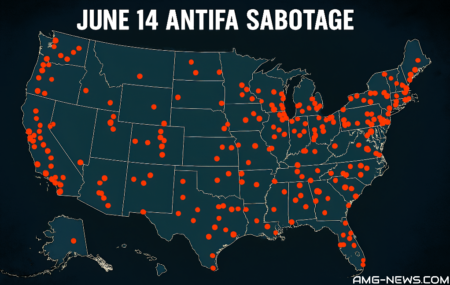The Great American Banking and Retail Apocalypse: Why Are Banks and Retailers Closing Thousands of Branches in 2024? (Video)
Medeea Greere, an independent publisher, is now on Telegram at https://t.me/AMGNEWS2022 and exists only on reader support as we publish Truth, Freedom and Love for public awareness. Thank You for your support!
Banks Are Closing Thousands Of Branches And Retailers Are Shutting Down Thousands Of Stores
As we step into 2024, the once-bustling streets of America now resemble eerie ghost towns, haunted by the specter of yet another financial crisis. You may be wondering, if the economy is supposedly thriving, why are we witnessing a cataclysmic surge in bank closures and the demise of countless retail outlets? The truth behind this unsettling phenomenon is both alarming and ominous.
In a relentless pursuit of cost reduction and a desperate attempt to ward off the looming economic catastrophe, countless banks and retailers are being compelled to shut their doors. Over the past two decades, the number of brick-and-mortar banks in the United States has dwindled by nearly half, and this disconcerting trend shows no signs of abating. Startling data from S&P Global Market Intelligence reveals that between 2022 and 2023, an astonishing 5,000 bank branches in America were permanently shuttered.
Shockingly, in 2023 alone, two titans of the banking industry, PNC Financial Services Group and U.S. Bancorp, mercilessly closed down one out of every ten of their branches.
This marks the fourteenth consecutive year of a relentless decline in the presence of banks on our once-vibrant high streets.
But what lies behind this alarming trend, and why are we witnessing such an aggressive assault on the very fabric of our society?
The Digital Takeover: In recent years, the surge in branch closures has been exacerbated by a seismic shift within the banking sector itself. A growing emphasis on digital services has led to a stark preference for online banking over traditional brick-and-mortar locations. While this transformation is palpable across the industry, it’s the low-income neighborhoods and rural areas that bear the brunt of this ruthless evolution. The brutal reality is that the cherished high street banking network, which once stood as a pillar of our communities, is vanishing right before our eyes.
 The Curse of “Banking Deserts”: Many of these marginalized areas are now cursed with what experts refer to as “banking deserts.” This grim consequence of the digital age has spawned a widening chasm in access to essential banking services, casting a long shadow over the lives of those who reside in these neglected communities. Individuals in such regions face an uphill battle in accessing crucial financial resources and support, all thanks to the relentless retreat of financial institutions from their physical roots.
The Curse of “Banking Deserts”: Many of these marginalized areas are now cursed with what experts refer to as “banking deserts.” This grim consequence of the digital age has spawned a widening chasm in access to essential banking services, casting a long shadow over the lives of those who reside in these neglected communities. Individuals in such regions face an uphill battle in accessing crucial financial resources and support, all thanks to the relentless retreat of financial institutions from their physical roots.
The High Cost of Survival: The harsh reality is that these financial institutions, in their frantic bid for survival, have made a Faustian bargain. Embracing digital platforms and slashing their physical presence may offer them a lifeline, but it comes at a price that’s steep and heart-wrenching. The casualties are not limited to the customers who are left in the lurch but extend to the very employees who once served as the lifeblood of these local branches. Fewer high street banks translate to fewer jobs, a grim truth that sends shockwaves through communities already reeling from economic turmoil.
But is this all part of a grander design, a sinister plot to strip us of our financial security and autonomy? As we delve deeper into the abyss of this financial upheaval, it becomes apparent that there’s more to this crisis than meets the eye.
The Great Reset: As the world grapples with the aftershocks of the COVID-19 pandemic, a sinister agenda may be lurking in the shadows. The closure of banks and the shuttering of retail stores paint a grim picture of an impending “Great Reset.” This term, often shrouded in conspiracy theories, suggests a global overhaul of the financial system and a redistribution of wealth on a colossal scale. While it’s crucial to approach such theories with skepticism, the undeniable truth is that the financial landscape is undergoing a seismic shift.
As we delve into the darkest corners of this crisis, it becomes apparent that a select few are poised to reap the benefits of this upheaval, while the masses are left grappling with the wreckage. In this age of artificial intelligence and digitalization, the question arises: Who truly holds the reins of power in this new era of finance?
The Rise of Digital Dominance: While we are led to believe that the closure of banks and stores is a mere consequence of economic pragmatism, it’s impossible to ignore the rising dominance of digital giants in the financial realm. The likes of Amazon, Google, and Facebook are not only shaping our online experiences but are also aggressively penetrating the financial sector.
Tech giants are becoming financial behemoths, offering an array of services from payment processing to lending, all under the guise of convenience and efficiency. But what lurks beneath the surface is a consolidation of power that threatens to stifle competition and control our financial destinies. As these digital giants amass data on our financial behaviors, they gain unprecedented insight into our lives and wield enormous influence over our economic decisions.
The Erosion of Privacy: In this new digital era, our privacy is under siege like never before. While we may be lured by the promise of convenience, the price we pay is our personal data. With every tap, click, and swipe, we relinquish control over our financial information, allowing tech giants to amass vast troves of data. This treasure trove of data is then leveraged to manipulate our choices, influence our spending patterns, and even determine our creditworthiness.
As banks retreat from the high street, the void is filled by these data-hungry tech giants who seek to capture every facet of our financial lives. It’s a Faustian bargain with our data as the currency, and the consequences are far-reaching.
The Impending Digital Divide: While the digital revolution may offer convenience to some, it deepens the divide for others. For those who lack access to the digital world, the closure of banks and retail outlets becomes a cataclysmic blow. The elderly, the marginalized, and the technologically disadvantaged find themselves alienated in a world that values screen taps over human interactions.
As we careen into this digital future, we must grapple with the consequences of this seismic shift. The digital divide threatens to leave vast segments of society in the shadows, devoid of the essential financial services and support they need to thrive.
The Call to Action: In the face of this daunting crisis, we must summon our collective strength to resist the tide of change that threatens to wash away our financial security and autonomy. We must demand transparency from tech giants and financial institutions alike, holding them accountable for the power they wield over our lives.
We must also champion initiatives that bridge the digital divide, ensuring that every individual, regardless of their technological proficiency or socio-economic status, has access to essential financial services. Community-based solutions and grassroots efforts can play a pivotal role in safeguarding our financial futures.
As we confront the relentless closure of banks and retail stores, we must remember that the power to shape our financial destiny ultimately rests in our hands. We have the agency to determine whether we succumb to the digital juggernaut or assert our rights to privacy, accessibility, and financial empowerment.
In Conclusion: The haunting transformation of our high streets into ghost towns, marked by the closure of banks and retailers, is a dire symptom of a larger shift in our financial landscape. While economic realities play a role, the rise of digital dominance and the erosion of privacy cannot be ignored.
The challenge ahead is immense, but it’s one that we must confront with determination and unity. The future of our financial security and autonomy hangs in the balance, and it’s up to us to ensure that we shape that future for the better. As we stand on the precipice of uncertainty, one thing remains clear: we must act now or risk being swept away by the currents of change.






![HISTORY REPEATS — TRUMP DEPLOYS NATIONAL GUARD TO L.A., JUST LIKE BUSH IN ‘92 — MEDIA SCREAMS “DICTATOR,” BUT THE TRUTH SAYS OTHERWISE [VIDEO]](https://amg-news.com/wp-content/uploads/2025/06/President-George-H.W.-Bush-deployed-not-just-the-National-Guard-but-also-the-Army-and-Marines-450x326.jpg)

![BOMBSHELL: PIZZAGATE EXPOSED — ELITE PEDOPHILE NETWORK TIED TO CLINTON, OBAMA, PODESTA & COMET PING PONG [VIDEO]](https://amg-news.com/wp-content/uploads/2022/03/amg-news-2-1-450x272.jpg)
![BREAKING REPORT! HOLLYWOOD’S BLOODLINE OF EVIL: TOM HANKS’ DAUGHTER EXPOSES GENERATIONS OF RAPE, SACRIFICE, AND OCCULT TORTURE [VIDEO]](https://amg-news.com/wp-content/uploads/2025/06/Tom-Hanks-child-sacrifice-450x264.png)


